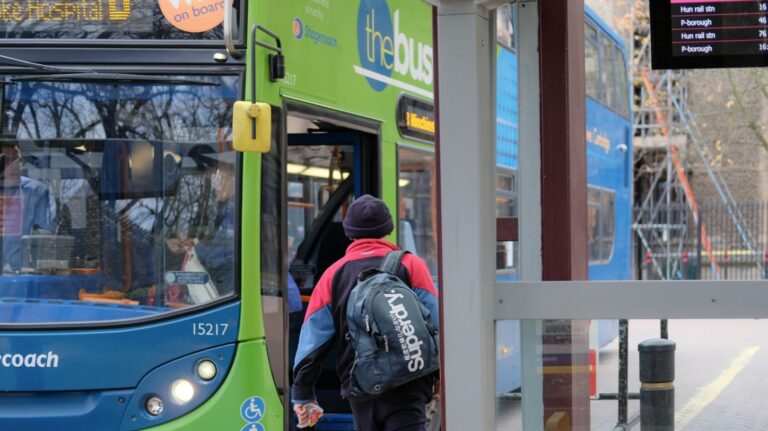Bus service provision outside of London has plummeting by more than 60% in 80 local authority areas in the past 15 years, new research shows.
Researchers from the University of Leeds, on behalf of Friends of the Earth, have analysed every bus timetable across England and Wales since 2008 for local environmental drop data.
On average, since 2008 urban bus services have dropped by 48% while rural buses have dropped by 52% across England and Wales.
Some areas have fared worse than others, with a 60% drop in the East Midlands, 57% in Wales and 52% in the North-East.
Meanwhile, the local authority areas of Hart, Fenland and Broxtowe saw significant declines of more than 80%.
According to the research, good quality, regular bus services are essential for the 22% of households that don’t have access to a car, which disproportionately affects people living on low incomes.
What’s more, they are also vital for helping people to reduce their car use to cut harmful carbon emissions and ease congestion in urban areas.
READ MORE: Liverpool residents vote in favour of bus franchising
The research also found that evening and nighttime services are particularly poor outside of London, which impacts shift workers without cars, such as NHS staff, and those who want to enjoy their local nightlife.
While bus services in London have remained at similar levels over the past 15 years, the analysis highlighted a stark contrast with urban areas outside the UK capital, which have an average of 14 buses per hour, compared to up to 120 in parts of London.
READ MORE: £80m delivered to improve and protect bus services in England
Head of science, policy and research at Friends of the Earth, Mike Childs, said: “There has been a silent war on bus users for over a decade.
“This is not only disproportionately impacting those living on low incomes, people of colour and disabled people who are less likely to own a car, but also people who have had to give up their car as they’ve got older or due to poor health.”
The data also showed a considerable difference along party lines, with the worst affected constituencies disproportionately administered by Conservative leadership.
Of the 100 constituencies with the greatest decline in buses, 82 are Conservative, 15 are Labour, two are held by the Liberal Democrats and one is administered by Plaid Cymru.
READ MORE: All new London buses to be zero-emission
Ahead of the next general election, Friends of the Earth called on all political parties to include a manifesto pledge for a ‘public transport renaissance’ and for the next government to commit to return bus services to 2010 levels within five years.
Childs added: “A bus renaissance is essential both for the millions of people who do not own a car in the UK and as part of a fair, green transition to a zero-carbon economy.
“To reduce pollution and cut emissions, we need the government to invest in our crumbling public transport system to make it far easier for people to use their car less and switch to greener ways to travel like buses, trains and cycling.”
Achievements and innovations in public transport will be celebrated at the third annual CiTTi Awards, which will be held on 26 November 2024 at the De Vere Grand Connaught Rooms in London. Nominations officially open in March 2024. Visit www.cittiawards.co.uk to learn more about this unmissable event for the UK’s transportation sector.





